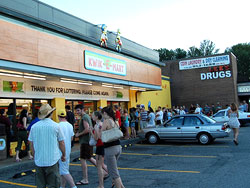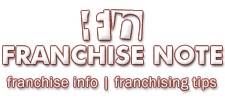
I’ve just read an article from the NYDailyNews.com that, in essence, echoes to what I believe all this time – Franchising as the legitimate business model in the midst of economic uncertainty.
The article, titled In weak economy, having your own biz, but not being on your own, has appeal, presenting three case studies of successful NY-based franchisees in different industries that thrive in today’s weak economy.
Here are my notes on the three interviews:
Jackie Reiter, Home Instead Senior Care franchisee
Jackie Reiter, a franchisee of Home Instead Senior Care in Staten Island, has been with the franchise for 7 years. She bought the franchise because she is passionate about helping the elderly to live well and be treated with respect.
What are appealing with franchising, according to her, is the business support and the fact that she wouldn’t be working alone.
Top note: “Franchises tend to have a model that works… You don’t have to reinvent the wheel.”
That statement is exactly what franchising is all about – Never mind the naysayer that undermine franchises as being expensive for no reason; franchising takes the risks and resources out from your equation, in term of seeking what’s work. And yes, “building a better mouse trap” is not necessarily what’s needed in entrepreneurship – You just need to ‘incorporate’ what works, and make them effective and efficient.
Piyush Patel, 7-Eleven franchisee
Patel’s case is the one that can describe my article about transforming an existing business into franchise unit better.
Sales at pharmacist Piyush Patel’s Queens Village store were suffering, ‘thanks’ to the recession and growing competition. He then decided to sign with 7-Eleven and convert his store. The conversion to 7-Eleven cost him a total of $225,000 and resulted in a 55% increase in sales afterward,
Patel (a.k.a. Peter) loves 7-Eleven’s continuous promotions and incentive programs, stream of new products from the HQ and the freedom to stock most products customers request.
Top note: “They have a good marketing program and the point of sale [system] makes it much easier to maintain your inventory… Franchising has made my store profitable again.”
This is where the power of a proven system lies. Although a proper system doesn’t guarantee profit, it considerably increases the likelihood for your franchise unit to be better managed, that will eventually lead to an increase in profitability.
Angela Shaw, the Entrepreneur’s Source franchisee
Shaw opened the franchise soon after the 9/11 attacks, matching clients with franchises. Her estimated amount of investment for the franchise is $80,000 (excluding reserves in startup period.)
She highlights franchising as ideal or the right kind of entrepreneur.
Top note: “You’re in business for yourself but you’re not by yourself… You have a partner.”
From my experience, I learn that franchisor-franchisee relationship is the biggest, non-tangible, asset in taking the franchise route. The knowledge transfer, the support and assistance, the pursuing of common goals and the possibility to network with successful business owners are some of the best value of franchising that no independent business can match.
Any thoughts to share?
Ivan Widjaya
A franchising concept: You’ll never walk alone
Image by dhepnar.
